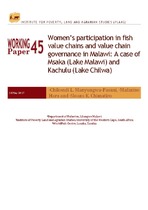| dc.contributor.author | Manyungwa-Pasani, Chikondi L. | |
| dc.contributor.author | Hara, Mafaniso | |
| dc.contributor.author | Chimatiro, Sloans K. | |
| dc.date.accessioned | 2019-03-14T12:18:04Z | |
| dc.date.available | 2019-03-14T12:18:04Z | |
| dc.date.issued | 2017-05 | |
| dc.identifier.citation | Manyungwa-Pasani et al (2017) 'Women’s participation in fish value chains and value chain governance in Malawi: A case of Msaka (Lake Malawi) and Kachulu (Lake Chilwa)’, Working Paper 45. PLAAS, UWC: Cape Town. | en_US |
| dc.identifier.uri | http://hdl.handle.net/10566/4526 | |
| dc.description.abstract | This paper helps to fill an important gap that exists in gender responsive fish value chains by analysing the
factors that influence women’s participation in fish value chains and value chain governance in Malawi. The
study was based on the premise that there is limited information on how fish trade contributes to the
livelihoods of specific groups within communities dependent on fisheries. In trying to assess the situation on
the ground a value chain analysis framework was adopted and focus group interviews, key informant
interviews and gender transformative approaches were used to analyse (a) value chain participation by men
and women; (b) institutional arrangements in the value chain; and (c) perceptions and experiences of men
and women in the value chain processes. In addition, relevant documents were reviewed to determine to
which extent gender is considered in fish value chains and their governance. The study findings show that
women are relatively integrated in all the nodes and activities of the value chain, even though their
participation in leadership positions is limited because men dominate leadership and decision-making
positions. From a governance point of view, the patterns of interactions identified are characterised by
special proximity and family ties. The study also identified an intermediary node of auxiliary actors who play
a critical role of brokering trade at the production and processing levels. It found that this role is not
adequately recognised by external support and government as there are no support services targeted for
such actors. The study contributed to a deeper understanding of women-specific issues in the fisheries sector
in Malawi, hence providing further opportunities for gaining support for women’s empowerment in the
fisheries sector. | en_US |
| dc.language.iso | en | en_US |
| dc.publisher | Institute for Poverty, Land and Agrarian Studies, University of the Western Cape | en_US |
| dc.relation.ispartofseries | Working Paper;45 | |
| dc.subject | Fish value chains | en_US |
| dc.subject | Women | en_US |
| dc.subject | Participation and governance | en_US |
| dc.subject | Malawi | en_US |
| dc.title | Women’s participation in fish value chains and value chain governance in Malawi: A case of Msaka (Lake Malawi) and Kachulu (Lake Chilwa) | en_US |
| dc.type | Working Paper | en_US |

